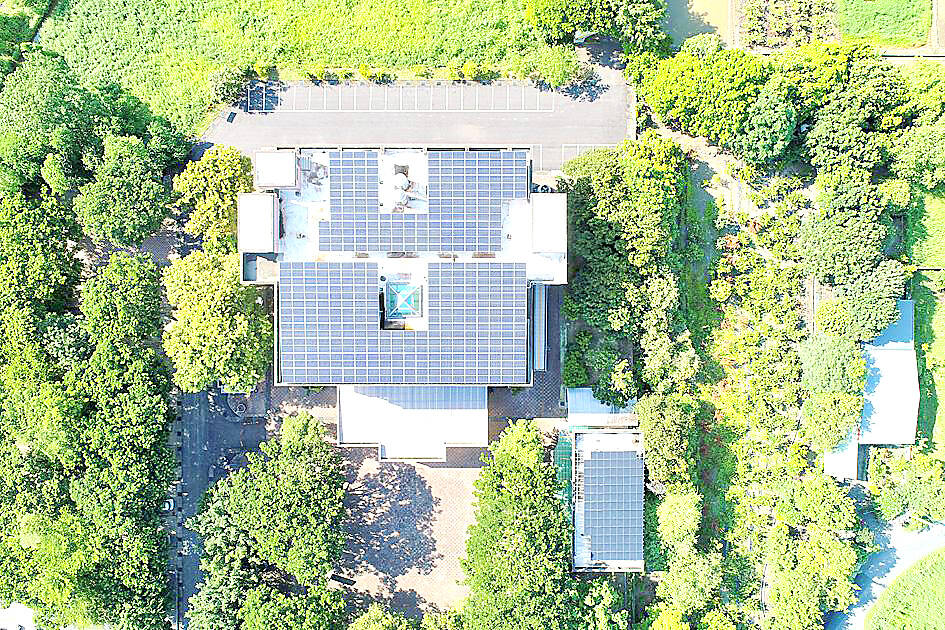The Ministry of the Interior has released a new draft of its rooftop solar panel mandate, exempting certain sites such as religious buildings from a requirement to install photovoltaic devices on all new structures and renovations of more than 1,000m2.
The draft exempts religious and funeral buildings, those that house hazardous materials, those that receive insufficient sunlight and other cases with “special circumstances.”
The legislature in 2023 passed amendments to the Renewable Energy Development Act (再生能源發展條例) requiring that all new construction, renovations or expansions that meet certain conditions be required to install rooftop solar panels.

Photo courtesy of the Tainan Bureau of Civil Affairs
It required the Ministry of Economic Affairs and Ministry of the Interior to stipulate criteria for the requirement.
The new draft states that all new buildings or renovations with an area of 1,000m2 or larger must install a 1 kilowatt per 20m2 solar panel system. Panels may be installed on the rooftop, awnings or on the ground to meet the requirement.
While previous drafts stipulated the “rooftop area,” the new draft instead specifies “building area,” a National Land Management Agency official said yesterday.
That means the area requirement would effectively be based on the area of the first floor, which is typically larger than the rooftop, the official said.
Religious and funeral buildings are exempt, as they have specific cultural or architectural value, as would buildings used for manufacturing, packaging, sale or storage of hazardous materials where installing solar panels could cause public safety concerns.
Buildings that cannot install solar panels due to special circumstances and structures that do not receive sufficient sunlight to meet the power generation standard would also be exempt if they provide supporting documentation such as a valid power-generation assessment.
The annual power generation standard is 543 kilowatt-hours (kWh) for Hsinchu City, Keelung, Taipei, New Taipei City, Taoyuan, and Hsinchu, Hualien, Miaoli and Yilan counties; 579kWh for Taitung County; and 625kWh for all other municipalities.
The standards are based on sunlight conditions in different regions and the effectiveness of solar panels, the official said.
If solar panels are not installed where required, construction and occupancy permits would not be issued, they added.
The Ministry of the Interior would complete a final revision of the mandate based on public feedback over the next 60 days. The Executive Yuan would then determine the implementation date.

Nipah virus infection is to be officially listed as a category 5 notifiable infectious disease in Taiwan in March, while clinical treatment guidelines are being formulated, the Centers for Disease Control (CDC) said yesterday. With Nipah infections being reported in other countries and considering its relatively high fatality rate, the centers on Jan. 16 announced that it would be listed as a notifiable infectious disease to bolster the nation’s systematic early warning system and increase public awareness, the CDC said. Bangladesh reported four fatal cases last year in separate districts, with three linked to raw date palm sap consumption, CDC Epidemic Intelligence

The manufacture of the remaining 28 M1A2T Abrams tanks Taiwan purchased from the US has recently been completed, and they are expected to be delivered within the next one to two months, a source said yesterday. The Ministry of National Defense is arranging cargo ships to transport the tanks to Taiwan as soon as possible, said the source, who is familiar with the matter. The estimated arrival time ranges from late this month to early next month, the source said. The 28 Abrams tanks make up the third and final batch of a total of 108 tanks, valued at about NT$40.5 billion

Two Taiwanese prosecutors were questioned by Chinese security personnel at their hotel during a trip to China’s Henan Province this month, the Mainland Affairs Council (MAC) said yesterday. The officers had personal information on the prosecutors, including “when they were assigned to their posts, their work locations and job titles,” MAC Deputy Minister and spokesman Liang Wen-chieh (梁文傑) said. On top of asking about their agencies and positions, the officers also questioned the prosecutors about the Cross-Strait Joint Crime-Fighting and Judicial Mutual Assistance Agreement, a pact that serves as the framework for Taiwan-China cooperation on combating crime and providing judicial assistance, Liang

A group from the Taiwanese Designers in Australia association yesterday represented Taiwan at the Midsumma Pride March in Melbourne. The march, held in the St. Kilda suburb, is the city’s largest LGBTQIA+ parade and the flagship event of the annual Midsumma Festival. It attracted more than 45,000 spectators who supported the 400 groups and 10,000 marchers that participated this year, the association said. Taiwanese Designers said they organized a team to march for Taiwan this year, joining politicians, government agencies, professionals and community organizations in showing support for LGBTQIA+ people and diverse communities. As the first country in Asia to legalize same-sex